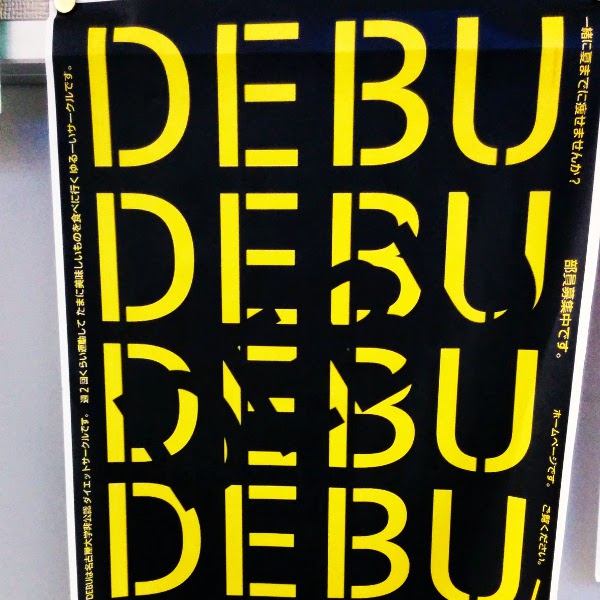Fat shaming (?) in Rōmaji
« previous post | next post »
Nathan Hopson found this poster hanging up all over student bulletin boards at Nagoya University in Japan:
debu デブ = "fatso; fat; chubby; plump; portly; tubby; pudgy; obese; stocky"
Apparently, the word derives from a (semi-?)mimetic Edo-period (1603-1868) term deppuri でっぷり, which in modern Japanese was fully mimeticized to debu debu でぶでぶ ("extremely fat; obese") and/or debu デブ. The use of katakana is probably for the same reasons given with gomi ゴミ ("rubbish; garbage"), i.e., emphasis (like italics) and readability.
As this poster says on the left side in the proverbial small print, "Debu" is the officially recognized Nagoya University diet circle [i.e., club]. We are a low-key (yurui ゆるい) circle who exercise about twice a week and sometimes go out to eat delicious food." (#irony?) In fact, the group's website suggests that there's a bit more to it. There are 2 weekly sessions each for: pool/gym and walking, and 3 for running.
Incidentally, yurui ゆるい (or ゆるーい on the poster, to emphasize the low-key, lackadaisical adjective) is very difficult to translate with the appropriate nuance. It can mean "loose" (as in loose-fitting, slack clothing), but is extended to mean "lax; without vigor, spirit", etc. The best-known usage internationally is in yurukyara ゆるキャラ (on which, see the Wikipedia English article and this photo gallery of the winners in this year's Yuru-Kyara Grand Prix). Note that yurukyara ゆるキャラ is written partly with hiragana and partly with katakana. It is a contraction of yurui masukotto kyarakutā ゆるいマスコットキャラクター ("laid-back mascot character"), where yurui ゆるい ("laid-back") is the opposite of "up-tight".
When I asked a Japanese friend if debu デブ could also function as a transcription of English "deb" (shortened form of "debutante"), she replied:
No, it cannot be used in place of debutante. デブ's pejorative image is too firmly established in Japanese (it's such an insult to girls/women to be called デブ), no one will dare use the word to mean debutante. Entirely wrong/opposite image.
This is a good example of the need for sensitivity in using Rōmaji transcriptions of foreign words that potentially clash with native katakana words. Anyway, for "deb" ("debutante" [debyutanto デ ビュタント]), Japanese use "debyū" デビュー, while "debu" デブ (でぶ) means "fatso". For "obese", probably "himan" 肥満 (ひまん) is more appropriate.
And then there's always o-debu-chan おでぶちゃん ("adorable fatso").
[Thanks to Cecilia Segawa Seigle and Hiroko Sherry]

Max Pinton said,
December 23, 2014 @ 1:14 am
Isn't debyū simply "debut" in Japanese, as in デビュー作?
chh said,
December 23, 2014 @ 9:51 am
Does 松 in Mandarin have the same range of meanings as「ゆるい」?
My friends who speak Chinese say the primary meaning of 松 for them is 'loose', like of clothing, but I only know it from taijiquan, where it means something like 'heavy, uncooperative relaxation', sort of like the feeling of a dog that doesn't want to be picked up. I don't know if that sense is archaic now or not.
jo lumley said,
December 24, 2014 @ 6:40 am
Max Pinton: デビュー debyuu can certainly also be 'début', in fact quantitatively I would guess デビュー is used for the meaning 'début' much more often than it is for 'deb[utante]'. Still, it would appear that the more obvious rendering of 'deb' as debu is blocked; I think, though, that the use of debyuu instead is also facilitated by the strong semantic connection between 'début' and 'deb' (i.e. a debutante is someone making her début).
And briefly about chh's comment, other people like me who know Japanese but not Chinese might wonder why 松 'pine tree' has anything to do with yurui… but apparently 松 is also a simplified version of 鬆, which in turn in my Japanese dictionary includes the word yurui as part of its definition. However, it is not one of the kanji customarily used to write yurui in Japanese.
Bathrobe said,
December 24, 2014 @ 7:26 pm
出不精 de-bushō refers to a 'stay at home type', from 出 de 'to go out' and 不精 bushō 'lazy, can't be bothered'. I've seen puns where it's reanalysed as デブ症 debu-shō 'fatness syndrome'.